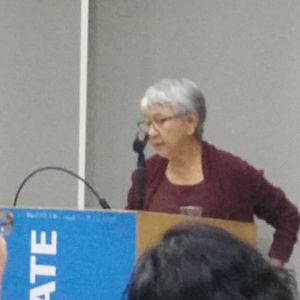Aihwa Ong facts for kids
Quick facts for kids
Aihwa Ong
|
|
|---|---|
| 王愛華 | |

Ong in 2016
|
|
| Born | February 1, 1950 |
| Education | Barnard College (B.A.) Columbia University (Ph.D.) |
| Occupation | Professor of Anthropology |
| Known for | Anthropologist, Professor & Author |
|
Notable work
|
Spirits of Resistance and Capitalist Discipline: Factory Women in Malaysia; Neoliberalism as Exception: Mutations in Citizenship and Sovereignty; Buddha is Hiding: Refugees, Citizenship, the New America; Flexible Citizenship: The Cultural Logics of Transnationality; Global Assemblages: Technology, Politics, and Ethics as Anthropological Problems |
| Scientific career | |
| Institutions | University of California, Berkeley |
| Thesis | Women and Industry: Malay Peasants in Coastal Selangor, 1975-80 (1982) |
| Doctoral advisor | Joan Vincent, Myron Cohen, Robert F. Murphy |
|
Aihwa Ong
|
|
|---|---|
| Chinese name | |
| Traditional Chinese | 王愛華 |
| Hanyu Pinyin | Wáng Àihuá |
| Jyutping | Wong4 Oi3 Waa4 |
| Hokkien POJ | Ông Ài-hôa |
| Tâi-lô | Ông Ài-huâ |
Aihwa Ong (born February 1, 1950) is a well-known professor of anthropology at the University of California, Berkeley. Anthropology is the study of human societies, cultures, and their development. She is famous for looking at how the world is changing, especially with globalization (when countries become more connected).
Professor Ong studies how people's lives and their rights as citizens are affected by big changes in the world. She looks at places from Southeast Asia and China all the way to the Pacific Northwest of the United States. Her ideas, like 'flexible citizenship' and 'global assemblages,' help us understand how people and cultures connect in our modern world. She is also interested in how different subjects like urban studies (the study of cities) and science and technology studies are linked.
Contents
Life and Career
Aihwa Ong was born in Penang, Malaysia, in 1950. Her family was Straits Chinese. She went to Barnard College and earned her first degree in anthropology in 1974. Later, she received her Ph.D. (a high-level degree) in anthropology from Columbia University in 1982.
After teaching for a few years, she joined the University of California, Berkeley in 1984. She has also been a visiting professor in places like Hong Kong, South Korea, and Singapore.
Professor Ong received a special award called a MacArthur Fellowship from 2001 to 2003. This award is given to talented people to support their important work. She also won awards for her books, including Flexible Citizenship and Buddha is Hiding.
In 2007, she was invited to the World Economic Forum in Davos, a big meeting where world leaders discuss global issues. She continues to teach and share her research around the world.
What Aihwa Ong Studies
Aihwa Ong's work explores how politics, technology, and culture mix together in fast-changing parts of the world, especially in Asia. She often looks at things from a different point of view, not just from the United States. This helps her understand how things like gender, social class, and what it means to be a citizen are changing.
As an anthropologist, Professor Ong uses a method called ethnography. This means she observes and studies people and cultures closely. She wants to understand how big global changes affect how people live today. For example, she has studied:
- How factory workers in Malaysia experienced new freedoms and also new rules.
- How Asian business owners moved their families and money to different countries.
- How Cambodian refugees learned to live in America and become citizens.
- How cities are changing and how modern art is growing in Asia.
Her current research looks at how governments, technology, and culture are shaping new ways of being human. She studies how biosciences (the study of living things) and genomic science (the study of DNA) are developing in places like Singapore and China.
Key Books and Ideas
Aihwa Ong has written many important books. Here are some of them, explained simply:
Buddha Is Hiding (2003)
This book is about Cambodian refugees who came to America. It tells their stories of becoming American citizens. Ong also looks at how American systems, like healthcare and welfare, affect minority groups.
Global Assemblages (2005)
This book talks about how global and local systems connect and create new ways of living. Ong explains that different systems, like those related to business, technology, and science, are spreading across Asia.
Neoliberalism as Exception (2006)
This book explores how some Asian countries use special economic rules to attract businesses and money. For example, they might create "free trade zones" where companies get special benefits. Ong calls this "graduated sovereignty," meaning different areas have different rules to help them grow.
Asian Biotech (2010)
This book gives us a look into the exciting world of biosciences in Asia. Ong shares studies on topics like genetically modified foods, medical tests, and stem cell research. These studies were done in countries like Singapore, China, and India.
Fungible Life (2016)
In this book, Ong talks about bioscience research in Asia. She explains how Asian biosciences and global science work together, especially in tropical places where there are many diseases. She gives examples of biomedical centers in places like Singapore and China. These centers study things like genetic differences and disease risks. Singapore is a good example because it has people from many different backgrounds, which helps scientists study a wide range of human genetics. This research can lead to big discoveries and help Asia become a leader in science.
See Also
 | Janet Taylor Pickett |
 | Synthia Saint James |
 | Howardena Pindell |
 | Faith Ringgold |

